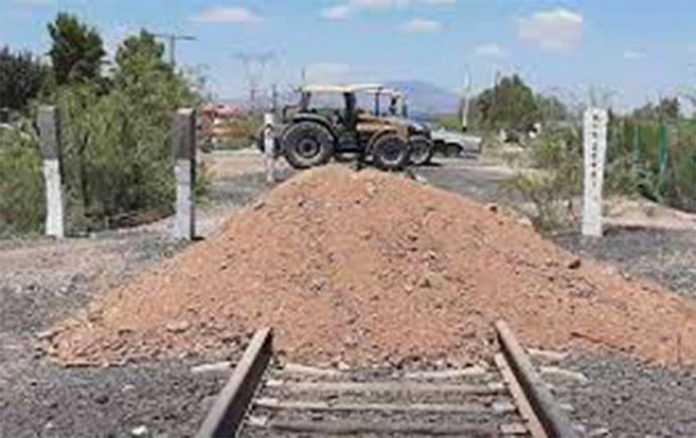A six-week rail blockade in Chihuahua by farmers opposed to the diversion of water to the United States has cost industry at least 19.35 billion pesos (US $912.4 million), according to the Confederation of Industrial Chambers (Concamin).
Javier Peña, president of Concamin’s transport commission, said the blockade in the municipality of Meoqui, where piles of earth and gravel were dumped on rail tracks in eight locations in late August, generates losses of 450 million pesos (US $21.2 million) per day.
He explained that the losses are incurred because businesses have to change the mode of transport to move their goods or seek alternative rail routes that bypass the blockade. The blocked railroad is an essential route between Mexico and the United States.
Peña said Thursday that the transportation of almost 19,000 full and empty freight containers had been delayed. Among the most affected sectors are agriculture, automotive, cement, chemicals and energy.
Jesús Francisco López, a director at the Nuevo León industry association Caintra, said the blockade is not only affecting the transport of goods from Chihuahua but also Aguascalientes and other Bajío region states.
Farmers have ramped up their protests in Chihuahua in recent months as the federal government seeks to comply with a large water debt to the United States, owed under the terms of a 1944 bilateral treaty.
Chihuahua Governor Javier Corral, who has clashed with President López Obrador over the northern state’s obligations under the treaty, met with a group of the disgruntled farmers last Friday and asked them to lift their rail blockade but they refused.
“We decided not to clear the tracks,” farmer Jaime García told the newspaper Reforma.
He said farmers took the decision because they fear that if they lift their blockade, federal forces will also retake control of the La Boquilla dam precinct, which has been occupied since September 8 to prevent the diversion of water.
“Soldiers and members of the National Guard will go to La Boquilla afterwards so it’s better that we don’t [clear the tracks],” García said.
He said that dozens of people are guarding the rail blockade day and night to prevent any efforts by authorities to remove them.
García said the farmers won’t clear the tracks completely unless the nine demands set out in a document submitted to the federal government’s Chihuahua delegate are met. However, two trains will be allowed to pass for each demand fulfilled, he said.
Among the demands are that no more water be diverted to the United States and that the army and National Guard withdraw from dams in Chihuahua and deploy instead to insecurity hotspots such as Ciudad Juárez and the Sierra region.
The farmers also want criminal complaints against them for damage caused during protests to be withdrawn. They claim that the damage to public and private property was caused by people with links to the ruling Morena party who were sent to infiltrate their protests.
A principal demand outlined in the document is for three farmers who were arrested in Delicias on September 8 – the night Chihuahua farmer Yéssica Silva was fatally shot and her husband was wounded during an alleged attack on their vehicle by the National Guard – to be released.
According to the Guard, the detained farmers were found to be in possession of tear gas and ammunition.
The document also calls for justice for Silva and her husband, who were attacked on their way home from a protest at the Boquilla dam.
García said the farmers haven’t received any response from the federal government’s delegate in Chihuahua.
Meanwhile, members of the dissident CNTE teachers union have continued to block railway tracks in Michoacán for the past week.
Teachers and teachers in training demanding the payment of bonuses, unpaid wages and scholarships as well as the automatic allocation of jobs to teaching graduates lifted their rail blockades late last month after state police allegedly threatened to remove them using force.
But they returned to the rail network in early October, blocking tracks in the municipalities of Uruapan and Yurécuaro.
The Michoacán Industry Association said 25 trains traveling between the port city of Lázaro Cárdenas and state capital Morelia have been held up and that losses over the past seven days total an estimated 350 million pesos (US $16.5 million).
Source: Reforma (sp)
